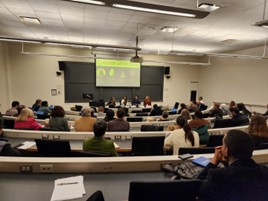Academic Research for Societal Impact: How NSF I-Corps Empowers Researchers Through Early Customer Discovery
October 28, 2024
As the Manager of Entrepreneurial Community at Drexel Applied Innovation, I am always promoting the NSF I-Corps program to help researchers expand the impact of their research. The program enables participants to explore the question of, “who outside of academia cares the most about my innovation, why, and by how much?” To answer this question, NSF I-Corps participants connect with the unmet needs of industry to learn about what real world problem their innovation is solving, how intense that problem is, and who it affects.
Through this process, scientists learn how to extend their focus beyond the laboratory to increase the economic and societal impact of research, which can help with future grants, finding industry funding, or launching a startup company around their innovation.
Participating in NSF I-Corps at Drexel also connects you to the larger NSF I-Corps Northeast hub, which consists of 11 partner institutions in the region and is led by Princeton University. Each year, Princeton hosts an annual meeting to convene the hub's participants, alumni, mentors, instructors, administrators, and other partners for networking, poster presentations, and speaker sessions focused on translating academic research into solutions for real-world societal needs.
 This year, I had the opportunity to moderate a panel discussion called “Unpacking Commercialization Support Programs: Opportunities and Assessment” and share learnings from a fantastic group of panelists who are senior leaders from some of the top regional and national support programs for Philadelphia startup founders and scientist entrepreneurs, including Marcie Reilly (Director, External Engagement and Partnerships, the Innovation Space), Andrew Chang (Managing Director, Activate) and Deepika Bhatnagar (Director, Nucleate NY). The central theme that guided our conversation was the enduring importance of customer discovery as an essential practice, both within the NSF I-Corps program and beyond.
This year, I had the opportunity to moderate a panel discussion called “Unpacking Commercialization Support Programs: Opportunities and Assessment” and share learnings from a fantastic group of panelists who are senior leaders from some of the top regional and national support programs for Philadelphia startup founders and scientist entrepreneurs, including Marcie Reilly (Director, External Engagement and Partnerships, the Innovation Space), Andrew Chang (Managing Director, Activate) and Deepika Bhatnagar (Director, Nucleate NY). The central theme that guided our conversation was the enduring importance of customer discovery as an essential practice, both within the NSF I-Corps program and beyond.
When promoting the NSF I-Corps program, I often hear people share that they feel they are “too early” to participate. However, one key takeaway from the panel discussion was that it is never too early to start this process. In fact, initiating customer discovery at an early stage can save you valuable time and resources. The result of learning how to articulate the societal value proposition of your research can also set you apart from other applicants when submitting proposals for funding or next step opportunities. Taking the time to truly understand the problem you're solving, identifying your target market, and demonstrating your capacity to develop and test hypotheses in this area are all qualities that can make you stand out in a competitive applicant pool.
Customer discovery often involves receiving tough feedback and being open to the possibility of pivoting, which can be challenging for founders who are deeply invested in their ideas. However, embracing this process, learning from feedback, and being adaptable can make you uniquely qualified for future opportunities.
If you are interested in learning more about applying to the NSF I-Corps program or have any questions, please feel free to reach out to applied_innovation@drexel.edu. We are always eager to help researchers and entrepreneurs take the next step in their journey towards making a real-world impact with their innovations and hope reflections from the panel discussion may encourage you!